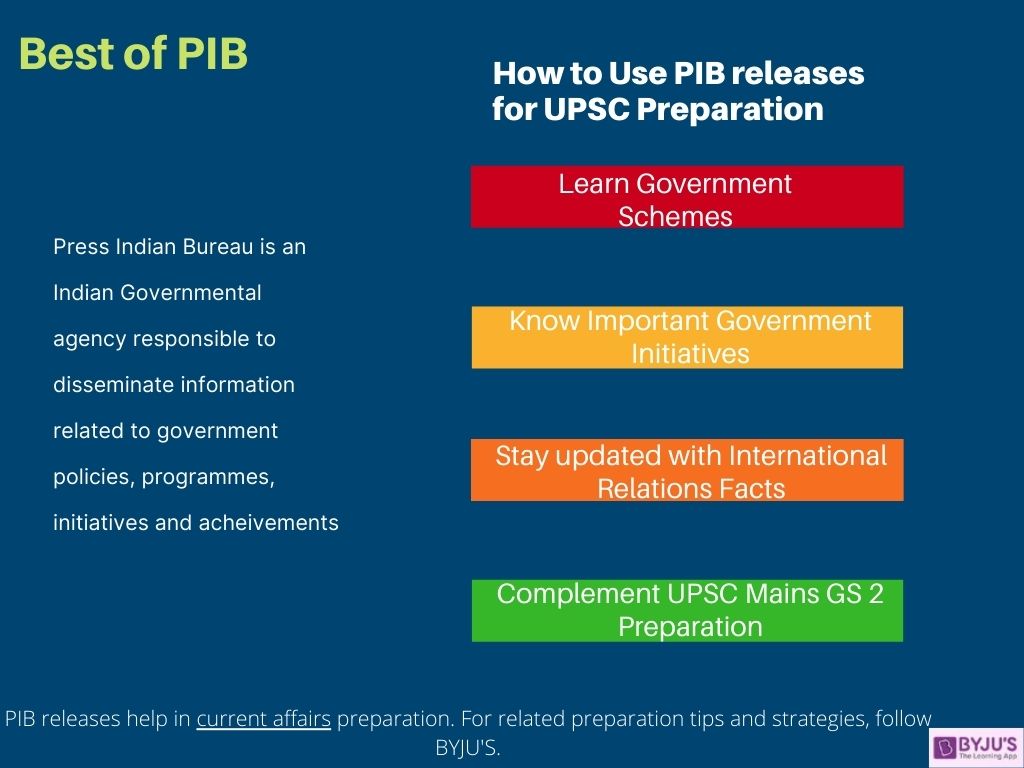Press Information Bureau (PIB) is the nodal agency disseminating news from the Government of India to the media. The releases of PIB are important from the IAS Exam perspective. The Best of PIB releases will help aspirants to understand the significance of particular issues in the news and its context in relation to the current affairs.
| PIB releases are an important source of current affairs preparation for the IAS Exam. To complement your preparation along with Press Indian Bureau releases, aspirants may check the following links: |
PIB & Current Affairs for UPSC

Current affairs for UPSC Preparation can be extracted from multiple sources. The most reliable sources of daily news updates are usually the official sources of the government and aspirants should follow the news from these sources closely.
The Press Information Bureau, also known as PIB is the nodal agency disseminating news from the Government of India to the media. Set up in 1919, it has grown into a large agency with more than forty offices all over the country. Its press releases give information to electronic, print and new media on the following topics:
- Government Planning
- Government Policies
- Programme Initiatives
- Achievements of the Government
The PIB also facilitates private media and provides technical assistance whenever requested.
Given the volume of news that PIB releases every day, BYJU’S releases the Best of PIB every day as a part of the Free Study Material for IAS, summarising the UPSC related news to help IAS aspirants stay up to date on Current Affairs for UPSC. Following PIB releases are very important for IAS preparation as most of the current affairs covered in the UPSC exam is available in PIB releases as they happen. This helps us understand the context of every news item and its relevance in the IAS exam.
What do we offer in Best of PIB?
BYJU’S Best of PIB has the following features to help aspirants with UPSC preparation:
- Daily analysis and summary of selected releases from the Press Information Bureau relevant to the UPSC Exam.
- Clear and concise explanation of the PIB Current Affairs.
- Best of PIB gives candidates PIB compilation of information on a daily, weekly, monthly and yearly basis.
- Access to related resources for IAS Current Affairs along with PIB Releases.
Why BYJU’S Best Of PIB?
BYJU’s Best of PIB offers ease of preparation and access in the following ways:
- Focussed summaries as the topics are carefully selected keeping in mind PIB Current Affairs for UPSC.
- Ease of revision as PIB Releases are available in a timely manner and are available for future reference.
- Ease of understanding as our experts make sure that the material is structured and written in an easy to read and concise manner.
- Free IAS preparation as we do not charge anything for these PIB insights and make them available all year round.
[FAQ_SCHEMA_START]
Information should be selectively gathered from the PIB articles and have to be revised from time to time. Here is How to study PIB for UPSC Exam?
You can read the Gist of Yojana, Gist of Kurukshetra and Economic and Political Weekly – Gist of articles to accelerate your preparation.
Which are the best current affairs sources for IAS Exam?
[FAQ_SCHEMA_END]